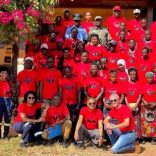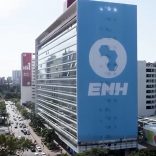Mozambique: Coral Sul tax payments expected to reach 16 billion dollars
Companies muscle into Mozambique’s gas pipe project

Reuters / Mozambican President Filipe Nyusi, left, meets China’s Premier Li Keqiang in Beijing in May. Chinese firms have taken the lion’s share of a proposed $6bn pipeline to bring gas from offshore fields in northern Mozambique to Gauteng, while JSE-listed SacOil has pulled out after new partners were introduced.
Little more than three months after SacOil Holdings signed a co-operation agreement to pave the way for the construction of the $6bn African Renaissance Pipeline Project connecting northern Mozambique’s gas fields with Gauteng, the JSE-listed company announced in late May that it would no longer be participating in the project.
Instead, an obscure private company, ProGas Investment Group, is the pipeline consortium’s only South African member, with a 24% stake in the project.
In late 2014 SacOil — which has no experience in developing a pipeline — first signed a joint development agreement for the project. The other signatories were the Public Investment Corporation (PIC), which owns 42% of SacOil, and IGEPE, Mozambique’s state investment agency.
It is envisaged that the 2,600km-long pipeline will have offtakes to neighbouring countries, and also deliver gas to major towns along the length of Mozambique, paving the way for electricity generation, as well as gas-driven industries, such as plastics and fertilisers.
A co-operation agreement announced in March 2016 superseded the 2014 agreement, in terms of which the PIC and IGEPE were replaced by ENH (Mozambique’s state oil and gas firm); the China Petroleum Pipeline Bureau (which has agreed to secure 70% of financing for the project from China) and Profin, a secretive Mozambican company.
Shortly after the signing, an investigation by the Centre for Public Integrity Mozambique showed that Profin is 46.7%-owned by former Mozambican defence minister Alberto Joaquim Chipande and his wife.
Yet another agreement was signed in late April, but this time instead of SacOil (which had announced it wanted to complete due diligence on the new deal) being the South African signatory, ProGas signed instead, along with an additional Chinese partner, the China Petroleum & Technology Development Corporation.
Registered in September 2015, ProGas has two directors: Nhlanhla Magubane and Tariq Yusuf.
…
Magubane, who signed the agreement in Maputo on ProGas’s behalf, is the founder of IKU Capital (an investment consultancy with a website that no longer functions), and holds other directorships.
Yusuf, 29, is a co-founder of ePower, which aims to bring low-cost solar power to poor rural communities, and is an executive director of the Intratrek Group “involved in implementing the group strategy of expansion through acquisitions and organic growth”, according to the company’s website.
An investigation conducted by the Mail & Guardian (M&G) in 2010 and 2011 ascertained that his father, Ibrahim Yusuf — Intratrek’s founder and executive chairman — is a Zambian citizen who was linked to a Lusaka-based Mandrax smuggling ring in the 1980s, brought stolen goods into Zambia in the early 1990s, and filched $29,000 from its parliament in 2002.
Zambia’s Drug Enforcement Commission, which described Ibrahim Yusuf as “a well-known drug trafficker”, sought Interpol’s assistance to bring him back to the country to face charges after he fled.
Intratrek has clinched a string of contentious solar energy deals in Zimbabwe, and is also the African distributor for the Tara KLamp, a controversial male circumcision kit.
The KwaZulu-Natal health department began using the Tara KLamp in 2010, despite the Malaysian device not having been approved by the World Health Organisation, and having fared so badly in a South African clinical trial that testing was cut short.
According to KwaZulu-Natal health MEC Sibongiseni Dhlomo, his department has used the Tara KLamp in 25% of the more than 610,000 male medical circumcisions it has conducted since 2010.
The M&G’s investigation unearthed a cosy relationship stretching back decades between the Yusuf family and South African political heavyweights, particularly those from KwaZulu-Natal.
One of Ibrahim Yusuf’s former employees told the paper that the father “always said he had connections in the ANC. He harboured ANC comrades when he was in exile in Zambia in the 1980s.”
In 2011, Ibrahim Yusuf donated a Lexus sports utility vehicle worth R1m to Zulu King Goodwill Zwelithini, who publicly endorsed the KLamp in the same year. He is also in business with the pro-Zuma former National Intelligence Agency head Billy Masetlha — they are both directors of a company, Vegarox.
Photos from September 2011 show Tariq Yusuf meeting President Jacob Zuma at a fundraising event. Zuma and Masetlha spent time in Lusaka in the 1980s, when the president was the ANC’s head of intelligence.
On May 31, SacOil said it had pulled out of the pipeline project “due to certain changes introduced in the joint venture agreement relating to the participants in the project, which impacted the equity stake attributable to SacOil”.
Clearly the company’s large PIC stake, and the fact it has several political heavyweights on its board — including former director-general of the State Security Agency Mzuvukile Maqetuka and former South African Reserve Bank governor Tito Mboweni — was not enough to prevent the latecomer ProGas from usurping SacOil’s role of South African signatory.
As a listed company, SacOil’s dealings will come under the kind of scrutiny that ProGas, as a private company, might be able to avoid.
ProGas’s commercial executive, Howard Craig, has extensive leadership experience — most recently at Rand Refinery and Sasol Petroleum International.
…
There is no evidence yet to suggest that ProGas’s inclusion in the joint venture agreement is improper. However, the fact that one of its two directors is involved in a group of companies that have had close and controversial dealings with powerful ANC figures does raise concerns, especially given the company’s sudden inclusion in the project 18 months after the pipeline was first conceptualised.
As funding for prefeasibility studies has only just been secured, the project’s future is far from definite.
Leigh Elston, the energy editor at Zitamar News, which has reported extensively on Mozambique’s oil and gas sector, says that the pipeline, if realised, would make this country “hugely dependent on Mozambique for its future power supply”.
“Some analysts estimate that, to justify a pipeline of that size, you’d need to anchor it on around 5GW of generation capacity. To put that into context, the first phase of SA’s gas-fired independent power producer tender is for 3.2GW,” she explains.
“For this reason, some argue it’s better for SA to import liquefied natural gas (LNG), because it offers flexibility over the source of gas.”
LNG could be purchased from the US, Qatar, Australia, and other smaller suppliers, so SA would not be reliant on Mozambique.
“The other issue is the price. (US-based) Cheniere Energy is reportedly offering to sell LNG cargoes into SA at around $5-$6 per 1-million British thermal units,” says Elston. “Given the huge cost of building the African Renaissance Pipeline, around $6bn, it will be very difficult for pipeline gas to compete at these prices.”
By: Alexander Mathews













Leave a Reply
Be the First to Comment!
You must be logged in to post a comment.
You must be logged in to post a comment.